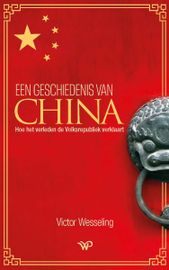
Een geschiedenis van China
Wie zich afvraagt hoe in het huidige China een symbiose van communisme en kapitalisme kon ontstaan, vindt in Een geschiedenis van China. Hoe het verleden de Volksrepubliek verklaart de informatie die voor een bredere culturele en historische benadering van deze vragen onontbeerlijk is. Tijdens de presentatie van dit nieuwe boek van econoom Victor Wesseling ontvangt voormalig president van de Nederlandsche Bank Nout Wellink het eerste exemplaar. Samen gaan zij in gesprek over Een geschiedenis van China en Wellinks ervaringen als directielid en toezichthouder bij de grootste bank in China.
Econoom Victor Wesseling, gespecialiseerd in internationale betrekkingen, is al zijn leven lang gefascineerd door China. Hij leerde de taal en ging er wonen om de unieke cultuur en politiek van het land, en daarmee de grote economische successen, te kunnen doorgronden. In dit boek verklaart hij overtuigend hoe China eind vorige eeuw in zo’n korte tijd van een gesloten volkshuishouding tot een van de grootste economische wereldmachten heeft kunnen uitgroeien, westerse technologie en ideologieën incorporeerde, maar tegelijk vrijheden van burgers bleef inperken. In Een geschiedenis van China. Hoe het verleden de Volksrepubliek verklaart onderzoekt Wesseling vijfduizend jaar geschiedenis – van keizerrijk tot volksrepubliek –, het complexe bestuurssysteem en de snelle ontwikkeling tot moderne maatschappij.
Over de sprekers
Victor Frank Wesseling is econoom, was werkzaam bij Internationale Zaken van de Nederlandse Bank en als universitair docent verbonden aan de leerstoel internationale economische betrekkingen van de economische faculteit van de Universiteit van Amsterdam. Hij bestudeerde de Chinese taal en verbleef enige tijd in China.
Nout Wellink is een Nederlands econoom. Sinds december 2018 is hij niet-uitvoerend lid van de raad van bestuur van de grootste Chinese staatsbank ICBC. Daarvoor was hij vanaf oktober 2012 toezichthouder in het bestuur van de Chinese Staatsbank Bank of China. Van 1997 tot 2011 was hij president van De Nederlandsche Bank, waar hij door Klaas Knot werd opgevolgd. Van juni 2006 tot en met 2011 was Wellink tevens voorzitter van het Bazels Comité voor bankentoezicht (BCBS).

:rgb(-15)

:rgb(-25)

:rgb(8)
